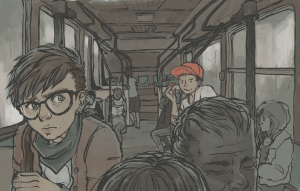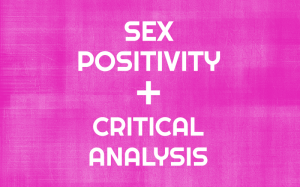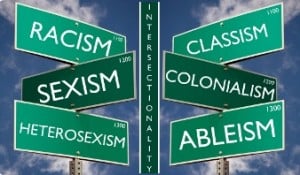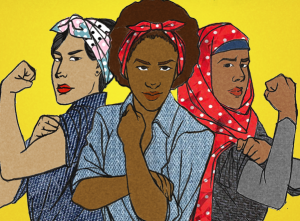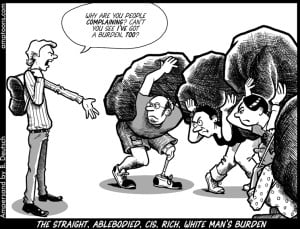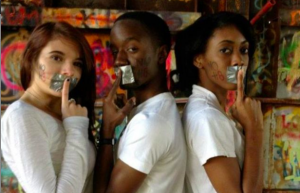As a black transmasculine person, I’ve engaged in and suffered from several forms of toxic and abusive expressions of “love.” I have been used often as an experiment for folks to push the boundaries of their sexuality and then tossed aside when cravings were satisfied.
Within our intimate connections – and sometimes in the larger queer community, we are often unfairly viewed as “predators” and enforcers of toxic masculinity.
We are rarely given the adequate space to work through the unique struggles we carry. Folks seek us out based on our “differences” and praise us for how well we “blend in.”
That ain’t love.
For those of us who identify beyond the gender binary, our bodies are often regulated, objectified, and hypersexualized. Society deems us undesirable and unworthy of unconditional love, and that often spills over into our intimate relationships.
I am quite frequently stripped of my agency in intimate relationships. In the past, when I’ve attempted to reveal the innermost pieces of myself and explained what I needed to feel safe and loved in a relationship, my partners classified my vulnerability as simply “complaining” or a refusal to “check my privilege.”
As I continue to grow and evolve, I recognize the internal, interpersonal, and institutional effects this toxicity creates.
I work very hard to stay present and mindful of the space I hold as a masculine of center person. It is a constant process to be reflective and intentional as I take ownership of the ways I perform my masculinity. I work hard to honor and respect the feelings of my partner(s) without neglecting my own feelings.
Part of reclaiming my agency is sitting with the discomfort of my vulnerability, acknowledging my feelings when they arise and refusing to allow myself to grow cold. I must hold myself accountable while challenging my romantic partner(s) to do the same.
It also takes conscious effort to move beyond promoting harmful masculine tropes within my intimate relationships. Society dictates the ways in which we perform our masculinity and our acceptance is hinged on these rigid representations.
We’re often socialized to be stoic, overtly aggressive and misogynistic. We’re taught that masculinity and femininity are mutually exclusive and that femininity only exists as a weaker counterpart to be controlled and manipulated for personal pleasure.
Masculine-identified folks (especially cis white men) rest comfortably atop of the social hierarchy.
However, it’s important that we remain mindful of the intersections. As transmasculine folks of color, we don’t always carry the same power and privilege (especially if we are non-binary, poor, fat, disabled, and so on) as a person we’re interacting with, especially if they are white, cis, femme or some other privileged position.
We must remember that privilege ebbs and flows and can be situational. We need more nuanced reflections that center our true narratives.
We need to create more safe spaces that allow for transmasculine and masculine of center folks to engage in practices that deconstruct, decolonize and unpack all the trauma we hold in our bodies.
We need to relearn ways to express our masculinity authentically, safely, and respectfully. We need to relearn ways to accept and exchange love. This is will allow us to heal from deeply held traumas ensuring that we are better partners, friends and community members.
My journaling within this blog is an effort to begin the process of creating blue prints to aid us in the unloading and working through of some damaging shit that we as transmasculine people are constantly inundated with and have internalized.
While masculinity absolutely needs to be deconstructed, there should also be space to honor the multidimensional aspects of our beings.
We, and our community, must allow us to redefine, reshape and reclaim our individual expressions of masculinity while loving and uplifting our partners in revolutionary ways.
So let’s get to a bit of unpacking.
Below is a brief list of some emotionally abusive patterns I’ve noticed that specifically affect transmasculine folks. Hopefully this may help you spot some signs in your partnership(s). If anything, it will let you know that you are not alone.
1. When Our Partners Police Our Masculinity
Abusive partners practice dominance and control by limiting or prohibiting our individual agency in expressing our masculinity, especially if it doesn’t line up with cis heteronormative standards or if it is too cis heteronormative appearing.
I know several transmasculine folks personally who have been condemned for not wanting to medically transition, undergo gender reassignment surgery or change their gender markers. It is as if these practices authenticate their identity to their partner(s).
But there is no one way to perform masculinity.
Often times, in very subtle ways, our partner(s) will attempt to dictate the way we express our emotions by guilt tripping us for not remaining stoic enough, especially in very emotional triggering situations. This is never okay.
Feeling restricted in expressing your whole self freely or living in fear of being ridiculed for the way you present is emotional abuse. You are the only one who gets to determine your gender identity/expression.
Hold your partner(s) accountable for the ways in which they may be unknowingly removing your agency from you.
2. When Our Partners Police Our Sexual/Asexual Practices
This can take the form of judging or condemning transmasculine folks for what we prefer sexually. This also speaks to the ways in which we are harshly critiqued when expressing our sexuality.
Also, transmasculine folks have little room to move beyond being viewed as aggressive deliverers of phallic-centered sexual acts. There is still stigma for those that wish to receive penetration or be pleasured in ways viewed atypical to societal standards.
There is also heavy stigma with those that wish to explore and solely engage in intimate acts that decenter sex.
It is abusive if partner(s) attempt to force us to engage and value one form of intimacy over another. Openly communicate with your partner about what feels most comfortable and safe to you.
3. When Our Partners Police Our Emotions
This obviously comes in many forms. I have personally noticed the immediate demonization towards our outward expression of anger.
I am in no way advocating for the release of anger at the expense of someone’s safety or comfort. However, anger, when expressed in healthy ways, can be very beneficial to off-loading trauma.
For those of us that undergo Hormone Replacement Therapy, noting that testosterone or lack thereof is the lone reason for our display of certain emotions diminishes our capacity in which we feel and express thoughts and feelings. This is abusive.
4. When Our Partners Reinforce the Idea That Only a Select Few Want to Be with Us
We don’t need reminders that society doesn’t give a shit about us.
We also aren’t going to give you a cookie because you “took a chance on dating a trans man.”
Please know that you aren’t doing us any favors. Don’t guilt trip us in to putting up with your crap by attempting to make us feel that there is no one else who will love us unconditionally.
This is violent, triggering, and abusive.
5. When Our Partners Purposefully Misgender Us
Often times, our abusive partners misgender us out of anger, to prove a point or because they think that we aren’t appropriately fitting the gender of our choosing.
This is violent and it seeks to delegitimize our perspective, logic, experience, and identity. It’s an attempt to take our power.
Similarly, abusive partners will resort to shaming and minimizing non-binary identities, attempting to force us to even choose and limit our expressions. Please remember that there is no finite amount of gender identities and labels.
Attempting to limit us based on your level of understanding is violence – and it’s abusive.
6. When Our Partners Guilt Trip Us into Becoming or Remaining ‘No/Low Disclosure’
You should never blame us for wanting to remain open or full disclosure with our identities. You should never blame or guilt-trip us for the societal backlash we collectively suffer from in our relationship.
We should always be given the agency to express our identity in ways that feel comfortable to us.
However, we are aware of all the sacrifices you have made to be with us and we should be able to work through things together and make decisions that include and support all lived experiences. Safety and livelihood factors should always be considered important.
Just know it is abusive to ask us to compromise our wellbeing solely for your individual comfort.
7. When Our Partners Highlight the Ways We Add Up or Fail in Comparison to Cis Folks
I personally don’t need the comparison.
Your validation of my life shouldn’t be hinged on how much my beard resembles your father’s beard. I also don’t need reminders that my hands and feet are small as compared to “the average man.”
Many of us have no intention of fitting a cis normative ideal in the first place. We are our own layered individuals. So please stop. It’s abusive and we don’t deserve it.
Transmasculine folks carry a lot of hurt around with us and we often suffer in silence. This world is so hellbent on violently eradicating our existence and we desperately seek the refuge of an intimate connection. We need the support and space to allow our wholeness to thrive.
It is so important that we truly holding ourselves accountable to the ways in which we promote patriarchy and the ways patriarchy is enacted on us.
It takes a collective effort to undo these deeply embedded standards. However, we can in loving and healing within our intimate partnerships.
[do_widget id=’text-101′]
Search our 3000+ articles!
Read our articles about:
Our online racial justice training
Used by hundreds of universities, non-profits, and businesses.
Click to learn more






